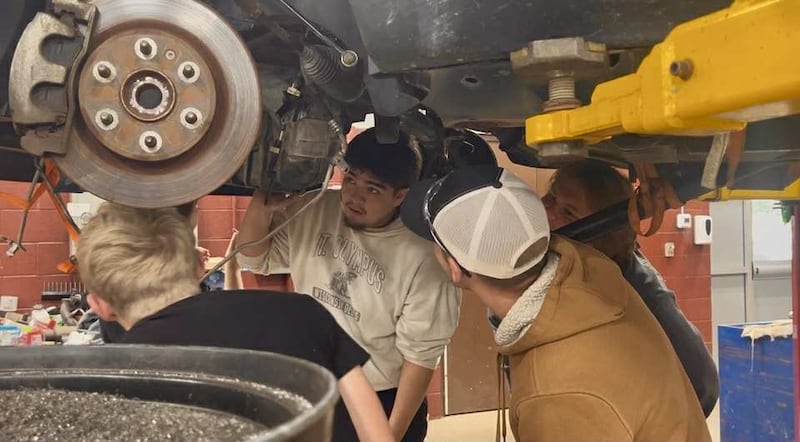At the Whiteside Area Career Center, students are using hands–on training to shift into high-gear careers in the automotive industry.
The WACC’s Automotive Technology serves as a launchpad for students seeking hands–on experience, certifications and direct pathways into the workforce. Designed for high school juniors and seniors, this one or two-year program immerses students in automotive repair, from brake pads to engine diagnostics, while offering real–world job experiences along the way.
First–year students focus on foundational skills: lubrication, brakes, engine tune–up, suspension, fuel injection, computer controls, electrical systems, exhaust systems and cooling.
“They learn the basics: brakes, suspension, even oil change maintenance,” instructor Bill Hare said. “Why we can’t just put any oil in a car, how to change belts... tires is a big one. With the oil changes, tires and alignment stuff that they learn, they can... go work entry level into a shop.”
Hare said the program enrolls about 120 students annually, offering them the opportunity to work on a variety of vehicles, including their own, as well as those brought in by customers. The class partners with local churches, county departments and state organizations to provide real repair opportunities.
Rock Falls High School junior Tucker Ullrich, now in his first year with the program, plans to become a mechanic after graduation.
“I joined the program because I’m interested in working on cars… doing transmission stuff and engine swaps,” said Ullrich, who also works at Moore’s Tires in Rock Falls.
In the second year, students dig deeper – working on differential operation, transmissions and clutches, engine diagnostics, heating and cooling systems. They also become eligible for work-based learning placements, where they spend part of their school week gaining on-the-job experience.
Now in his second year with the program, Oregon High School senior Logan Embick is already putting his skills to use through a work-based learning placement at Dabney Trucking in Dixon.
“I like working on cars, and I’m going into diesel after I graduate, so I figured I might as well get a head start,” Embick said.
Students train using Automotive Service Excellence standards, giving them a solid foundation for the industry certification process. Hare said the curriculum and testing are designed to mirror ASE-style exams, so students are familiar with the format and expectations.
While they need two years of professional experience before officially earning ASE certification, the program prepares them to pursue it once they meet that requirement. Free online study tools are available, and many students begin working toward certification after gaining on-the-job experience.
“We can get them ready to take the test,” Hare said. “They need two years experience before they can take and pass the test and get their certificate, but we’re preparing them to go out to do that.”
On May 20, the WACC held its Work-Based Learning Signing Day, honoring nine students who turned their internships into job offers. Recognized for their professionalism and strong work ethic, the students represented various local high schools and were each hired by their internship employers.
With the national shortage of skilled auto technicians, WACC’s program fills a vital need. Students graduate ready to step into entry-level roles, and local shops gain reliable, skilled workers who already know their way around a garage.
“I have a student in first block that is going to work at a custom shop... where they make and manufacture couches out of car trunks,” Hare said. “We’ve had some people go to Ken Nelson. I’ve had a rock star go down and is a diesel technician. She does very well. And a lot of our guys go on to do work for Ford.”
Looking ahead, Hare hopes to introduce hybrid and electric vehicle training to the program – an area he has avoided so far due to safety concerns. He is currently researching safe, entry-level training modules that avoid the high-voltage risks typically associated with electric vehicle systems.
Instructor Jason Krueger has been with the program for eight years. During that time, he has seen major improvements in both equipment and instruction, thanks in large part to WACC Director Josh Johnson.
“He saw some of the deficiencies in the program right away,” Krueger said, noting that Johnson helped secure funding to modernize the shop. As a result, students now train on updated tools and technology, including a new alignment rack, modern A/C systems, and specialized equipment for steering and suspension work.
“We’re pretty well equipped to do just about anything on vehicles,” Krueger said, adding that these upgrades ensure students are prepared to step into today’s workforce with experience using the latest industry tools.
The WACC is a cooperative endeavor of 16 member school districts and three parochial schools, educating students who come from five counties: Bureau, Carroll, Lee, Ogle and Whiteside, according to WACC’s website. Most of the population is from Sterling, Rock Falls and Dixon, with the remainder residing in surrounding rural areas and small towns.
For more information, visit wacc.com.
